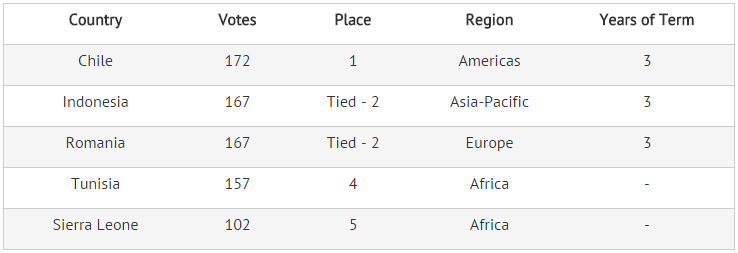


On July 22-23, 2015, in South Africa second annual elections took place at the Open Government Partnership Steering Committee meeting. Based on the voting results, new members of the Steering Committee were named: Indonesia, Chile and Romania.
According to the OGP Articles of Governance, partner countries need to choose the new members of the Steering Committee annually. At the end of September 2015, three countries of the Steering Committee: Indonesia, Philippines and Tanzania are finishing their one-year term. To this end, voting was open from July 1 to July 30 and 59 member countries out of 65, nearly 90% of the OGP member countries casted their ballot. Five countries (Chile, Indonesia (for re-election), Romania, Sierra Leone, Tunisia) had nominated themselves for the membership of the Steering Committee.
Nominated countries can only be elected for the position if they satisfy the Eligibility Criteria ensured by the Support Unit. To prevent a tie, voters were required to rank their preferences. For instance, 5 points for the top choice, 4 points for the second choice, etc. Based on such voting system, Chile occupied the first position with 172 votes while Romania and Indonesia both shared 167 points.

The Open Government Partnership Steering Committee is composed of the governmental and civil society representatives. They together shape the development and direction of the OGP. Steering Committee holds three meetings per year, unless the Chair of the Committee notes the necessity of an additional meeting.
The newly elected members: Chile, Romania and Indonesia will occupy the 3 year-term position from October 1, 2015. From this date, the public representatives in the Steering Committee will be from following countries: Brazil, Chile, Mexico, the USA, the UK, France, Georgia, Indonesia, Romania, Croatia and South Africa.
The OGP Steering Committee also consists of civil society representatives: Sugeng Bahagijo - International NGO Forum on Indonesian Development, Manish Bapna - World Resources Institute, Cecilia Blondet - Institute for Peruvian Studies, Veronica Cretu - Open Government Institute, Mukelani Dimba - Open Democracy Advice Centre, Alejandro Gonzlez - GESOC, Nathaniel Heller - Results for Development, Suneeta Kaimal - Natural Resource Governance Institute, Warren Krafchik - International Budget Partnership, Fernando Straface - CIPPEC, Martin Tisne - Transparency & Accountability Initiative (Omidyar).
The new members of the Steering Committee are committed to reach openness and transparency of governance and increase citizen engagement in policy making.
The new member of Steering Committee, Chile, started its Return to Democracy in 90s. The country initiated various cultural changes for achieving governmental transparency. Altering the makeup of government was a milestone of the process. However, one of the most significant reforms Chile has undertaken was providing citizen access to information. To this end, country enacted a law on access to information and for ensuring the compliance, Chile established a Council of Transparency.
As a result of the reform mentioned above, information about the properties, assets and potential conflicts of interest of government officials were disclosed. Release of the information led to increased civic control and citizens starting gaining a position of public watchdog. It essentially assisted building integrity and accountability among public officials. Notably, Chile is also a Co-Chair of Legislative Openness Working Group along with the NDI.
Romania conducted dialogues with the civil society representatives for expanding transparency in the public institutions. For combating corruption and enhancing public dialogue in the county, the consultations with the civil society representatives clarified the need for an Action Plan that would focus on creation of an Open Data format. Open Data would include information about public procurement, the budgetary policy and its allocation. Romania joined the Open Government Partnership in 2011 and currently is implementing its second OGP Action Plan.
Indonesia is a Co-founder of the OGP and later in 2012-2014 was also the Co-Chair. The government of Indonesia believes openness of the government is an essential necessity for modern governance since it can unleash the innovation, county's potential for economic development, enhancement of public services and so on.
For more information, visit the following link.